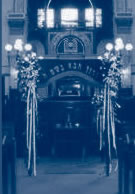|
Sedra Yitro: Hertz Chumash p. 288 Exodus
Chap 18. verse 1
This week's Sedra is generously sponsored by Paul Southwick.
SYNOPSIS:
While Moses carried out his mission in Egypt, his family
had returned to Midian. Now that the Israelites were in the
wilderness, Moses' father-in-law, Yitro, brought his daughter,
Zipporah, and Moses's son to Rephidim. Moses welcomed Yitro
affectionately and related all that G-d had done for the Israelites.
His father-in-law fully acknowledged G-d's power and offered
sacrifices to Him.
Observing that Moses was overburdened with judicial duties,
Yitro advised his son-in-law to create a judicial system at
graded levels and to delegate his authority while concentrating
only on the difficult cases. Moses acted on this sage advise.
On the first day of the third month (Sivan) after they had
departed from Egypt, the Israelites arrived in the wilderness
of Sinai and camped in front of Mount Horeb. Moses approached
the mountain and heard the voice of G-d instructing him to
remind the people how He had delivered them from Egypt. If
they obeyed Him, they would be transformed into a "kingdom
of priests and a holy nation." Moses descended from the
mountain and repeated G-d's words to the Elders and to the
people. A united nation responded, "All that the L-rd
has spoken we will do!"
Moses reported these words to G-d and was told that G-d would
appear in a thick cloud and speak to him before the entire
assembly so that His Divine mission would never again be doubted.
The people were to prepare themselves for three days in anticipation
of the great event of the acceptance of the Torah. They were
not to touch the boundaries around the mountain under penalty
of death.
After these three days had elapsed, on the sixth of Sivan,
thunder and lightning erupted and a dense cloud descended
on the mountain. The call of the shofar was heard and Moses
brought the people to the foot of the mountain. Mount Sinai
was enveloped in smoke and G-d summoned Moses to its summit.
G-d bade him to warn the Israelites not to gaze upon the Divine
Manifestation. Moses did as ordered. Then followed the supreme
moment in the history of the world. The voice of G-d Himself
was heard by every man, woman and child as He declared the
foundations of religious and moral conduct for all time :
1. I am the L-rd your G-d who delivered you from the land
of Egypt...
2. You shall have no other gods before Me...
3. You shall not take the name of the L-rd your G-d in vain...
4. Remember the Sabbath day to keep it holy...
5. Honour your father and your mother...
6. You shall not murder.
7. You shall not commit adultery.
} 8. You shall not steal.
9. You shall not bear false witness against your neighbour.
10. You shall not covet your neighbour's house...
The people were so awed by all they had witnessed that they
withdrew from the mountain and pleaded with Moses to speak
to them in place of G-d lest they die.
Moses then drew near to the thick darkness and received a
series of laws. The first four precepts dealt with important
aspects of Divine worship: the prohibition of idolatry; the
creation of an altar made of earth for sacrificial offerings
but only when G-d commands that an altar of stone must be
built of unhewn rock and not fashioned by iron instruments;
and, to guard his dignity, the law that the priest should
ascend to the altar not via steps but on a slope.
HAPHTORAH : HERTZ CHUMASH P. 302 Isaiah Chap. 6
The haphtorah opens with the prophet's declaration : "....
I saw the L-rd ..." This, and the ensuing description
of his awe inspiring vision of "...the L-rd sitting upon
a throne high and exalted ..." are a fitting response
to momentous events of Revelation and the Giving of the Torah
as described in the Sedra. The call to Isaiah to undertake
a sacred mission is reminiscent of G-d's call to Israel to
be a "kingdom of priests and a Holy nation".
TELL ME RABBI ... THE TEN COMMANDMENTS (Literally : The
Ten Sayings).
The recitation of the Ten Commandments originally accompanied
the daily sacrificial service in the Temple. This practice
was abolished early in the Talmudic period "so that the
heretics should not say these (commandments) alone were given
at Sinai". Since then they no longer feature in the statutory
service. Similar reasoning forms the background to the difference
in custom between those authorities who maintain one aught
to stand during the recitation of the Decalogue and those
authorities who assert that one should remain seated.
For Maimonides the equal importance of all parts of the Torah
was so basic that he asserted in the Eighth of this Thirteen
Principles of Faith (Mishnah commentary of Sanhedrin, Chapter
10): "There is no difference between the verse 'Timna
was the concubine of Eliphaz' (i.e. the grandmother of Amalek)
(Gen. 36:12) and 'I am the L-rd your G-d' of the Ten Commandments.
The Decalogue was retained at the end of the Morning Service
only for private recitation, together with other passages
from the Torah recited daily by the pious. The difference
between private and public recitation was marked even in the
cantillation - uniquely among Biblical texts.
Individuals reading the Decalogue are to use the "Taam
Tachton - Lower Notes" which divide the Hebrew text into
verses like the rest of the Torah, whilst the "Taam Elyon
- Upper Notes", which break up the text into ten paragraphs
- one single and complete section for each Commandment - are
meant exclusively for public recitation on the Sabbaths when
the Ten Commandments are read in the portion of the week (Yitro
and Va'etchanan) and on Shavuot.
"Shabbat Shalom" is generously sponsored by Rosetta
and Nathan Baron
BACK TO SHABBAT SHALOM
TABLE
|








